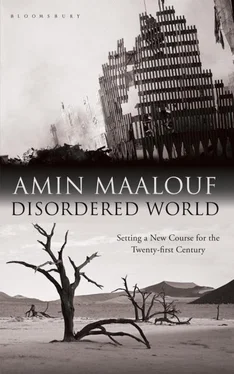When on 1 January 1965 a communiqué announced the first military operation by a previously unknown Palestinian organisation, the Egyptian president knew at once that this action was not solely aimed against Israel or Jordan, but also against him. Up until that point, the Palestinians had been Nasser’s most enthusiastic supporters, because it was they who had had to leave their homes when the state of Israel was created, and who hoped to return there through an Arab victory. In the meantime, most of them were living in refugee camps and had placed all their hopes in Nasser.
Nasser himself never missed an opportunity to lambast the ‘Zionist enemy’, to bring up the setback suffered by Israel during the Suez Crisis or to promise fresh victories to come. The Palestinians had been persuaded that the Egyptian president’s nationalist mobilisation was the only route which would permit them to win. But some of them were beginning to grow impatient. They had had enough of their struggle constantly being sacrificed to other priorities and constantly deferred. Nasser was clearly in no hurry to go to war against Israel. First he had to achieve Arab unity, drive out colonialism, consolidate the socialist economy, overcome reactionary regimes and so on. The founders of Fatah believed that the Palestinians ought to conduct their own fight according to their own agenda. Their first communiqué amounted to a declaration of independence — and also one of defiance — with regard to other Arab leaders and in particular with regard to the most prominent of them, Nasser.
Mockery of Nasser was also growing in various quarters. Hadn’t he had enough time since 1956 to prepare a war against Israel? Hadn’t he been sufficiently well armed by the Soviets? Hadn’t he acquired planes, tanks and even submarines? Wasn’t it strange that not a single shot had been fired against the common enemy in ten years?
The Egyptian president was not insensitive to these criticisms. After all, his accession to power had come about as a direct reaction to the Arabs’ defeat in 1948 and he had arrived promising to repair that affront. This was the context in which he had become a hero. In 1956, he had given the crowds a foretaste of the promised victory, and in his speeches he constantly held up the glittering prospect of other battles to come. The crowds listened to him and trusted him; they did not expect him to launch a battle before he was ready, but his credit had its limits. Especially if others were now taking up arms against Israel.
And that is precisely what happened after 1 January 1965. One Fatah operation succeeded another and its press releases were reported in the media.
The most militant sector of Arab public opinion cheered; and in the conservative monarchies too the exploits of the Fedayeen were admired, and compared favourably to the duplicitous rhetoric of Nasser, ‘who prefers to send his troops to fight in Yemen rather than in Negev, Jaffa or Galilee’.
The Egyptian president’s position became yet more awkward when Israel began to react violently to Fatah’s attacks. On the night of 11–12 November 1966, an Israeli border patrol encountered a landmine which went off, killing three soldiers and injuring six others. Believing that the Palestinian commandos who planted it came from the village of es-Samu in the West Bank — which then belonged to the kingdom of Jordan — the Israelis launched a massive reprisal attack on 13 November. But instead of encountering the Fedayeen, they came face to face with a detachment of the Hashemite army. A violent battle ensued, which at one point involved the air force. Sixteen Jordanian soldiers were killed as well as the Israeli colonel directing the operation. In the village, dozens of houses were destroyed and three civilians killed.
The Israeli reaction was universally condemned or at least strongly criticised, not just by the Arabs, Soviets and non-aligned countries, which were in the habit of condemning everything that Israel did, but also by the Americans, who could not understand why anyone would want to destabilise one of the rare moderate regimes in the Arab world, which had always been the least hostile to the Jewish state.
In Israel itself, many people felt that the operation had been misguided and also badly executed. Moshe Dayan, the former chief of the armed forces and future defence minister, asked why it was Jordan that had been attacked when everyone knew it was Syria that was financing and arming the Fedayeen. The idea that the wrong target had been hit was quickly admitted by most leaders, who promised that next time they would come knocking on the ‘right door’.
In fact, attention was turning more and more towards Damascus, as a result of its support for Palestinian militants and also because of the increasingly frequent engagements between Syrian artillery on the Golan Heights and Israeli troops stationed in the Galilee settlements. On 7 April 1967, a minor border skirmish escalated into an aerial combat in the skies above Damascus. Six Syrian planes were shot down.
All these events reverberated more and more in Arabic public opinion, where the same questions kept arising: what was Nasser doing? What was the Egyptian army doing? When people didn’t ask these questions spontaneously, some sectors of the media took it upon themselves to whisper them in their ears, with a reminder that Nasser ran no risk of being attacked himself, unlike the Jordanians and Syrians, ‘since he was hiding like a timid little girl in the skirts of the United Nations’ — an allusion to the fact that international observers had been posted in Gaza and all along the Egyptian–Israeli border since the Suez Crisis. This had been a condition of the Israeli forces evacuating Sinai, and Nasser had agreed after obtaining a guarantee from the UN secretary general, the Swede Dag Hammarskjöld, that they would be withdrawn as soon as Cairo requested it.
The accusation of timidity had become a recurring refrain at this time for all Nasser’s enemies, on both the right and the left. The Arab media linked to the Jordanian, Saudi and Iranian monarchies — now grouped in an ‘Islamic pact’ in opposition to the Egyptian president — never missed a chance to draw attention to the disparity between his bellicose words and his actual behaviour. But the official press in Damascus was no less virulent; it no longer held back from describing Nasser in language previously reserved for pro-Western leaders. It spoke of cowardice and capitulation, and accused him of leaving the Egyptian army far from the battlefield while the Syrian army was currently at the front, ready to have it out with the enemy and to crush them.
Nasser could not stand for this. If it had just been a matter of invective and tirades, then perhaps he could have brushed it off. But tension was mounting in the region, and there was a persistent sound of marching boots. Was military confrontation really on the horizon? He knew that his enemies wanted to catch him out, and he was just as mistrustful of the intentions of Damascus or of the armed Palestinian movements as he was of Tel Aviv and Washington, London, Amman and Riyadh. In private, he told those close to him that a trap was clearly being set and that he would not allow himself to be caught.
Nonetheless, if tension continued to mount and did indeed lead to war, how on earth could he stand idly by? How could the standard-bearer of the Arab nation leave his army on the sidelines if other Arab armies were engaged in fighting with the common enemy?
On 12 May, press agencies reported statements by a high-ranking Israeli military official claiming that his country had decided to overthrow the Syrian regime if it continued to support the Fedayeen. The following day, an Egyptian figure who had hitherto played only a minor role, Anwar Sadat, then president of the parliament, made a brief stop-off in Moscow on the way back from a routine courtesy visit to Mongolia and North Korea. He was expecting to be politely greeted by some civil servant, but in fact some of the USSR’s top leaders met him to tell him that, according to their sources, the Israelis had amassed fifteen divisions on their northern border and an invasion of Syria was imminent — ‘ten days away at most’. As soon as he returned to Cairo, Sadat went to see Nasser, who had just been given the same information by the Soviet ambassador.
Читать дальше












